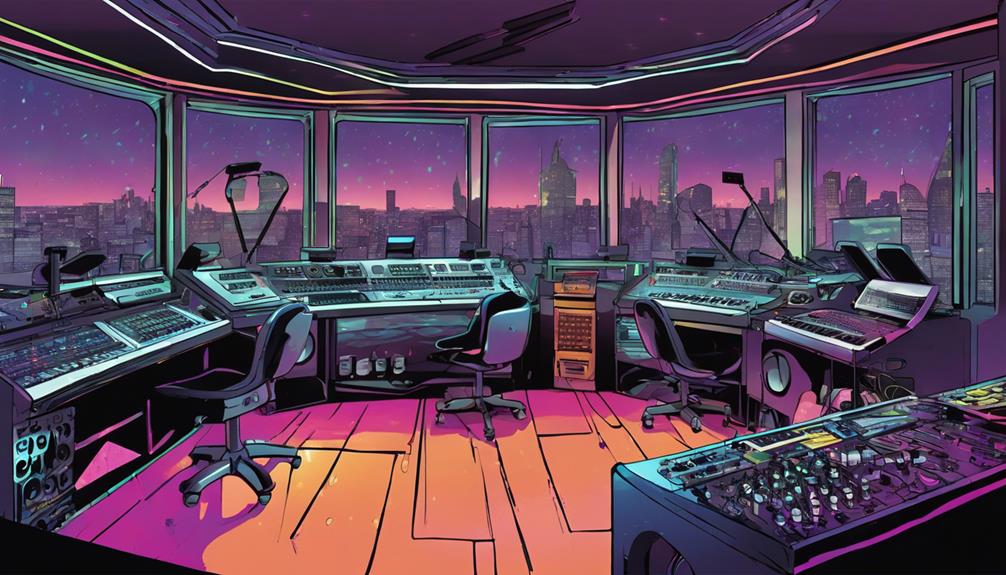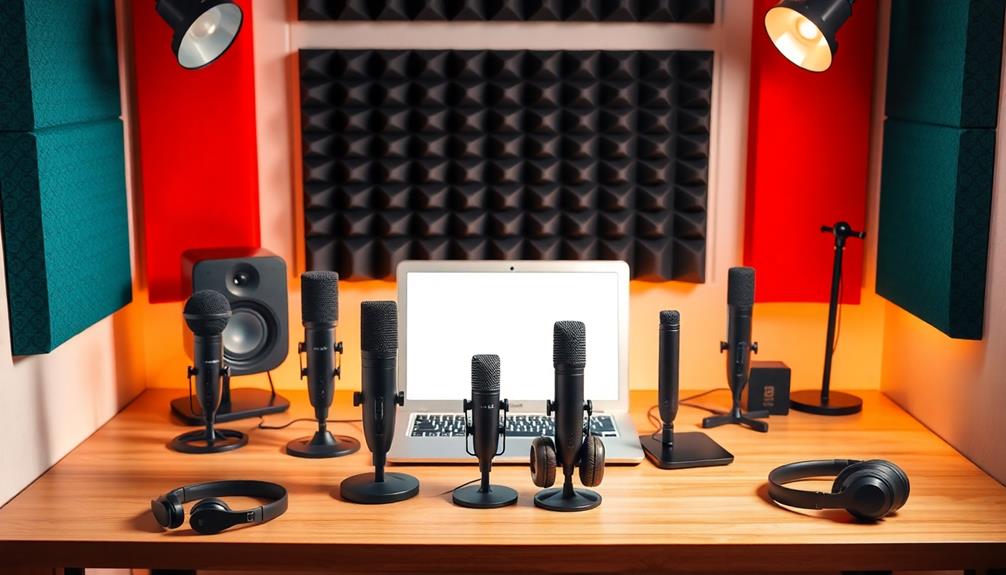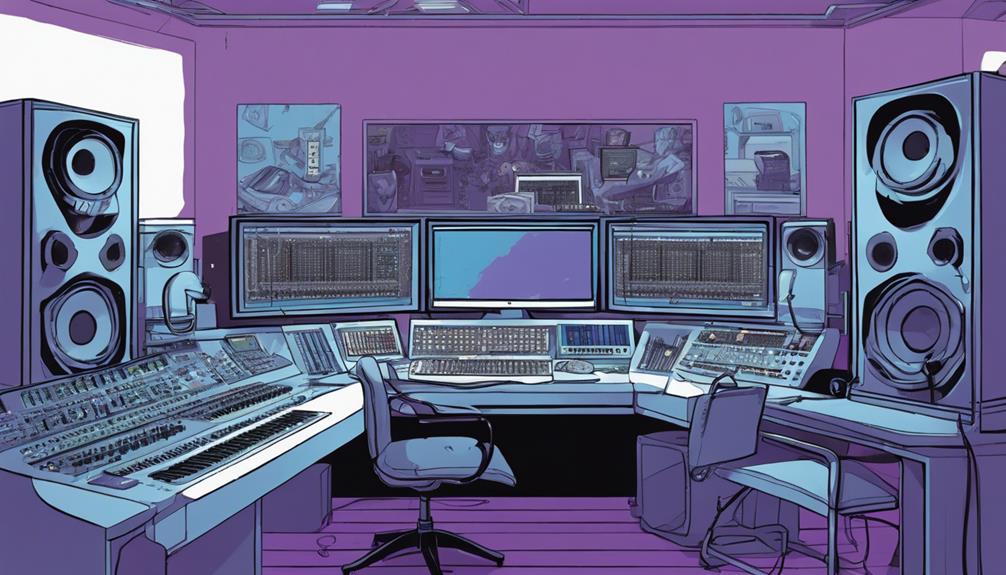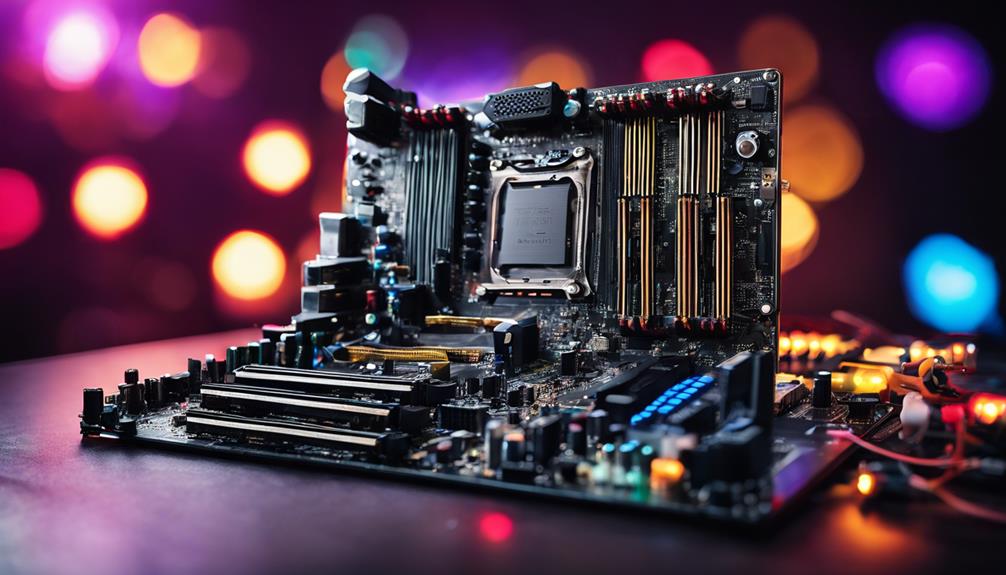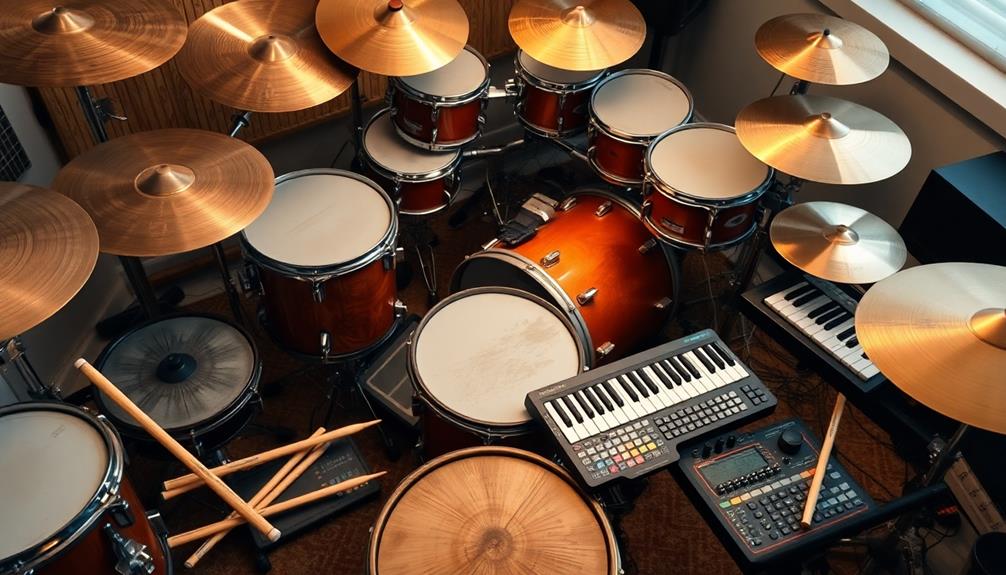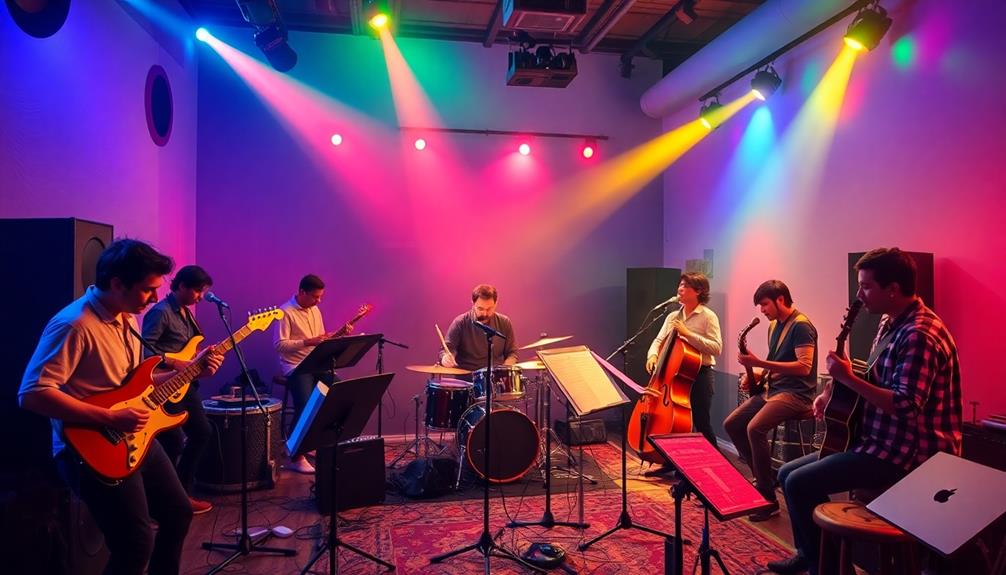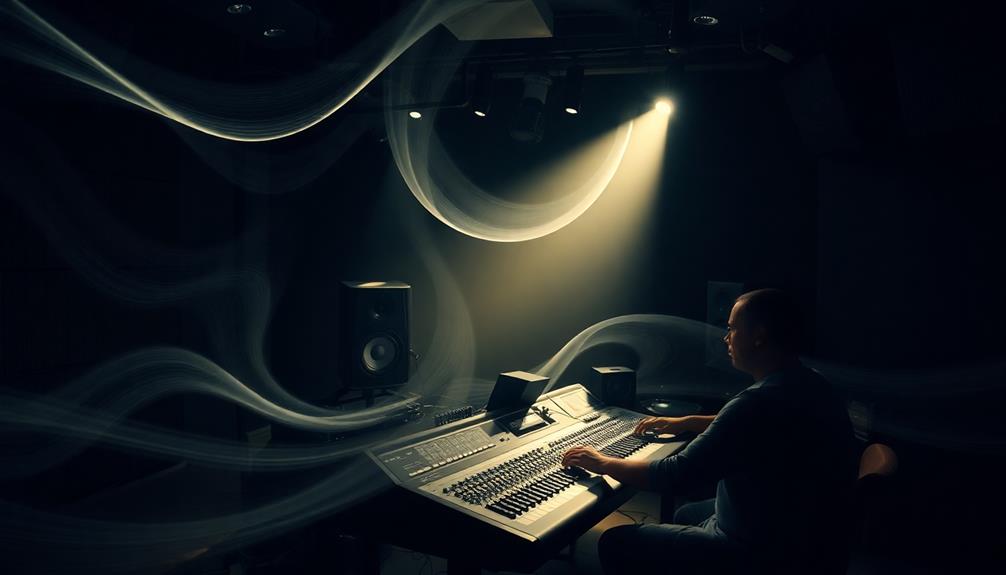When searching for the best colleges for music production and audio engineering in 2025, I consider factors like cost, program curriculums, faculty experience, industry connections, and campus recording facilities. I also look for colleges with small class sizes, which provide more interactive learning experiences, hands-on training, and closer relationships with faculty. Job placement rates, industry connections, and mentorship programs are also vital. According to my research, the top colleges for music production and audio engineering in 2025 offer a combination of these factors. If you're looking to launch your career in music production and audio engineering, I've got the inside scoop on the top colleges that can help you succeed – let's explore further. These institutions provide cutting-edge technology and state-of-the-art studios to ensure students develop real-world skills. Many of the best colleges for music production also host networking events and collaborations with industry professionals, giving students a competitive edge after graduation. With a strong focus on practical experience and career development, these programs are designed to set you up for success in the dynamic world of audio engineering.
Key Takeaways
- Consider colleges with strong industry connections, job placement rates, and mentorship programs for a successful music production and audio engineering career.
- Evaluate program curriculums, faculty experience, and campus recording facilities to ensure comprehensive training and hands-on experience.
- Smaller class sizes and lower student-teacher ratios provide more interactive learning, individualized feedback, and tailored instruction for optimal learning.
- Research successful alumni stories and college reputation to gauge the effectiveness of the program in launching careers in the field.
- Look for colleges with high job placement rates, internship opportunities, and strong industry connections to ensure post-graduation employment.
Audio Mastering Secrets (Music Production Secrets)

If you're serious about producing high-quality sound and want to discover the secrets of professional audio mastering, then 'Audio Mastering Secrets (Music Production Secrets)' is an indispensable resource that will elevate your skills to the next level.
This book is a treasure trove of practical tips and knowledge, drawing from the author's 20 years of experience in mastering over 7,500 clients. I appreciate how the author, John Rogers, shares his expertise in a clear and easy-to-understand language, making it accessible to both beginners and semi-professionals in the field.
The book covers a range of topics, including mastering compression, EQ, and spectral enhancement, as well as problem-solving techniques and setting up a listening environment. With its focus on real-world experiences and step-by-step instructions, 'Audio Mastering Secrets' is an essential guide for anyone looking to improve their audio mastering skills and produce professional-sounding music.
Best For: Those interested in mastering audio, including DIY musicians, beginners, and semi-professionals in the field of audio mastering.
Pros:
- Provides valuable tips and knowledge not commonly found in other resources
- Offers clear language and easy-to-understand explanations, making it accessible to a wide range of readers
- Focuses on real-world experiences and step-by-step instructions, making it a practical guide for improving audio mastering skills
Cons:
- May not be suitable for advanced audio mastering engineers who are already familiar with the techniques and concepts covered in the book
- Does not provide a comprehensive overview of audio mastering theory, instead focusing on practical applications
- May not be applicable to those without a basic understanding of audio production and recording principles
Audio Mastering Book

For those seeking to refine their skills in music production and audio engineering, a thorough understanding of audio mastering is essential, and 'Audio Mastering: The Artists' provides a unique opportunity to learn from the best in the industry.
This book is a treasure trove of insights, featuring interviews with leading mastering engineers who share their experiences and techniques. With over 60 hours of discussions distilled into a detailed overview, readers can gain a deeper understanding of the audio mastering process from the perspective of the artists involved.
From how engineers got their start to the tools and techniques they use, this book offers a wealth of information for those looking to improve their craft. I found the book to be insightful and enjoyable, and I highly recommend it to anyone interested in audio mastering.
Best For: Audio engineers, music producers, and anyone interested in refining their skills in audio mastering.
Pros:
- Provides a comprehensive overview of audio mastering from the perspective of leading engineers in the industry
- Offers detailed insights into the experiences and techniques of top mastering engineers
- A valuable resource for those seeking to improve their craft and gain a deeper understanding of audio mastering
Cons:
- May not be suitable for beginners who lack a basic understanding of audio engineering and music production
- The book's focus on interviews may not provide a step-by-step guide to audio mastering
- Availability may be limited, as it is printed in Japan and primarily available on Amazon.co.jp
The Sound Reinforcement Handbook

What sets The Sound Reinforcement Handbook apart as a valuable resource for aspiring music production and audio engineering students is its thorough coverage of designing and using audio amplification systems for public address and musical performance. This all-encompassing guide, written by Gary Davis and others, provides a deep understanding of audio theory and practical applications.
With its revised edition, I appreciate the addition of almost 40 new pages, an index, and a simplified page and chapter numbering system, making it easier to navigate. The book's focus on analog audio, including microphones, speakers, and cables, provides a solid foundation for understanding sound reproduction. I find the detailed information on MIDI, synchronization, and logarithms particularly helpful.
The authors' clear and concise explanations of complex topics make it an indispensable resource for both amateurs and professionals in the field.
Best For: Aspiring music production and audio engineering students, volunteer sound persons, and professionals in the field of sound engineering.
Pros:
- Provides a thorough understanding of audio theory and practical applications, including designing and using audio amplification systems for public address and musical performance.
- Offers clear and concise explanations of complex topics, making it an indispensable resource for both amateurs and professionals.
- Covers a wide range of topics, including MIDI, synchronization, and logarithms, and provides a solid foundation for understanding sound reproduction.
Cons:
- Some rough spots in writing, although the overall greatness of the book outweighs them.
- Limited example specifications, although they can be found online.
- Some quality issues noted in the spiral-bound version.
Mixing Secrets for the Small Studio (Sound On Sound Presents…)

If you're an aspiring music producer or audio engineer seeking to elevate your mixing skills, 'Mixing Secrets for the Small Studio' is a highly recommended resource. This book is an all-encompassing guide that covers a wide range of topics, from basic concepts to advanced techniques, providing detailed solutions to common mixing problems.
The author, Mike Senior, offers practical advice and step-by-step guidance, making it easy to follow and implement his strategies. His approach is backed by industry experts and focuses on achieving professional results in home studios, which is perfect for those with limited budgets.
The book is structured to guide readers through the mixing process, emphasizing the importance of each step. It includes recommendations for free plugins and stresses the importance of proper monitoring and acoustic treatment.
I appreciate the author's unbiased approach, free from fads or hardware/software preferences, making it a valuable resource for both beginners and experienced enthusiasts.
Overall, 'Mixing Secrets for the Small Studio' is a must-have for anyone looking to improve their mixing skills and achieve commercial-grade audio mixes.
Best For: Those with some experience in mixing who want to improve their skills and achieve professional-grade audio mixes in a small studio setting.
Pros:
- Provides practical advice and step-by-step guidance for achieving commercial-grade audio mixes
- Covers a wide range of topics, from basic concepts to advanced techniques, and offers detailed solutions to common mixing problems
- Offers an unbiased approach, free from fads or hardware/software preferences, making it a valuable resource for both beginners and experienced enthusiasts
Cons:
- May not be suitable for complete beginners in mixing
- Does not cover recording or mastering, focusing solely on the mixing process
- May require supplementary materials, such as online tutorials, to complement the knowledge gained from the book
Audio Engineer Coffee Mug

As an aspiring audio engineer, I'd be thrilled to start my day with a coffee mug that proudly declares my profession, making the 'I'm The Sound Guy' mug from Flairy Land an excellent choice.
This ceramic mug is designed with functionality in mind, boasting a comfortable handle and a capacity of 11 ounces, perfect for my morning coffee. The microwave-safe feature is a bonus, allowing me to quickly reheat my beverage whenever needed.
The exclusive design, featuring a letter print pattern, isn't only visually appealing but also long-lasting, ensuring the image remains vibrant even after multiple uses. This mug is an ideal gift for music lovers and professionals alike, suitable for various occasions and perfect for hot or cold beverages.
Best For: Audio engineers, music lovers, and professionals who want a functional and visually appealing coffee mug that showcases their profession.
Pros:
- Microwave-safe and dishwasher-friendly, making it easy to clean and reuse.
- Comfortable handle provides a secure grip, reducing the likelihood of accidents.
- Exclusive design with a long-lasting image print that remains vibrant even after multiple uses.
Cons:
- The product is listed as "reusable" but also "disposable", which may be confusing for some customers.
- The mug is only available in 11oz size, which may not be suitable for those who prefer larger or smaller cups.
- The material feature is listed as "ceramic", but it would be helpful to know if it's also lead-free and non-toxic.
The MIDI Manual: A Practical Guide to MIDI in the Project Studio

For those looking for an in-depth guide to MIDI in the project studio, 'The MIDI Manual: A Practical Guide to MIDI in the Project Studio' proves to be a valuable resource, offering a detailed overview of MIDI technology and its practical applications.
As I explored the book, I found it to be particularly helpful for beginners looking to gain a thorough understanding of MIDI. The author, David Huber, provides clear explanations and helpful illustrations, making it easy to grasp complex MIDI concepts.
While some readers may find the book lacking in practical tips for creating realistic MIDI files, it's an excellent starting point for those new to MIDI.
With its extensive coverage of topics including electronic instruments, sequencers, and setting up MIDI systems, this book is a great addition to any music production or audio engineering student's library.
Best For: Beginners in MIDI looking to gain a comprehensive understanding of MIDI technology and its practical applications.
Pros:
- Clear explanations and helpful illustrations make it easy to grasp complex MIDI concepts
- Provides a detailed overview of MIDI technology and its practical applications
- An excellent starting point for those new to MIDI, with extensive coverage of topics including electronic instruments, sequencers, and setting up MIDI systems
Cons:
- Lacks practical tips for creating realistic MIDI files
- May not meet the needs of more advanced users
- Some readers find the book more suitable for those with a technical background than for musicians
Sound Design: The Expressive Power of Music, Voice and Sound Effects in Cinema

Exploring the secrets of sound design in cinema can be a game-changer for music production and audio engineering students looking to elevate their storytelling skills. 'Sound Design: The Expressive Power of Music, Voice and Sound Effects in Cinema' is an in-depth guide that delves into the theoretical aspects of sound design, examining how our brains interpret voice, music, and sound to enhance cinematic storytelling.
The book provides practical guidance on enhancing sound effects for increased emotional impact, with try-this sidebars offering experimental ideas to inspire creative approaches to sound in film.
Renowned sound designers like Ben Burtt and Gary Rydstrom share insights on applying concepts from the book in Hollywood blockbusters, making it an excellent primer for filmmakers and students alike. The book's focus on the emotional aspect of sound design showcases how sound, voice, and music can profoundly impact the audience, offering a valuable resource for those interested in film sound.
Best For: Film students, music production and audio engineering students, and filmmakers looking to elevate their storytelling skills through sound design.
Pros:
- Provides comprehensive coverage of sound design in films, balancing technical information with inspirational content.
- Offers practical guidance and experimental ideas to inspire creative approaches to sound in film.
- Includes insights from renowned sound designers and focuses on the emotional aspect of sound design to profoundly impact the audience.
Cons:
- No cons mentioned in the provided text.
Music and Technology in the Twentieth Century

If you're an aspiring music producer or audio engineer looking to harness the power of technology to shape the sound of the future, understanding the evolution of music and technology in the twentieth century is essential.
In this era, a new machine music emerged, and electronic musical instruments were introduced, revolutionizing the way we create and experience music. The synthesizer's social construction was explored, and the player piano paved the way for computer music. Composers took on roles resembling sound technicians, and Yamaha played a significant role in Japan's musical development.
Even unexpected influences like airplanes and locomotives had an impact on music. The 45-RPM record's origins were also examined, showcasing the rapid progress of music technology.
Best For: Aspiring music producers, audio engineers, and music enthusiasts seeking to understand the evolution of music and technology in the twentieth century.
Pros:
- Provides a comprehensive understanding of the evolution of electronic musical instruments and their impact on music
- Offers insights into the social construction of the synthesizer and its role in shaping music
- Explores the influence of technology on music, including the impact of airplanes, locomotives, and the 45-RPM record
Cons:
- May be too technical for readers without a background in music or technology
- Focuses primarily on the twentieth century, with limited discussion of modern developments
- May not provide practical guidance for music production or audio engineering
Audio Engineer Coffee Mug

This ceramic coffee mug, featuring a humorous 'Don't Mess Sound' design, is a thoughtful gift for music production and audio engineering students, professionals, or enthusiasts who appreciate a good laugh while enjoying their daily brew.
As an audio engineer, I can affirm that it's not every day you find a mug that recognizes the importance of sound quality. This 11-ounce mug, made by Flairy Land, isn't only microwave-safe but also dishwasher-friendly, making it a practical addition to any studio or office.
The comfortable handle and temperature-resistant design guarantee that my drinks stay hot or cold for hours. Whether I'm celebrating a successful recording session or just need a pick-me-up, this mug is the perfect companion.
Best For: Audio engineering students, professionals, or enthusiasts who appreciate a good laugh while enjoying their daily brew.
Pros:
- Microwave-safe and dishwasher-friendly, making it a practical addition to any studio or office.
- Comfortable handle and temperature-resistant design guarantee that drinks stay hot or cold for hours.
- Humorous 'Don't Mess Sound' design makes it a thoughtful and unique gift for audio engineers.
Cons:
- The mug is disposable, which may not be environmentally friendly.
- The material feature is listed as "ceramic" but also as "reusability: disposable", which is contradictory.
- The product care instructions mention machine washing, but it's not clear if this is recommended or not.
Audio Engineer Coffee Mug

As music production and audio engineering students, we appreciate a good laugh, and the Audio Engineer Coffee Mug's humorous design and microwave-safe ceramic material make it an ideal choice for our daily coffee routine. This 11-ounce mug, designed by Flairy Land, isn't only functional but also dishwasher-friendly, making it perfect for busy students like us.
The 'Sound engineer Thing' design is a great conversation starter, and the comfortable handle guarantees a secure grip. Whether we're grabbing a morning coffee on the go or need a pick-me-up during a late-night studio session, this mug is a thoughtful gift for ourselves or a fellow music enthusiast.
With its high-quality print and durable ceramic material, this mug is sure to become a staple in our daily lives.
Best For: Audio engineering students, music production enthusiasts, and professionals in the music industry who appreciate a humorous design and a functional coffee mug.
Pros:
- Microwave-safe and dishwasher-friendly ceramic material makes it easy to use and clean.
- The comfortable handle provides a secure grip, perfect for morning coffee on the go or during busy studio sessions.
- The high-quality print ensures the design lasts a long time, making it a great value for the price.
Cons:
- The mug is disposable, which may not be environmentally friendly.
- The product care instructions are limited to machine washing, which may not be suitable for all users.
- The warranty information is not provided, which may be a concern for some customers.
Audio Engineer Coffee Mug

For music production and audio engineering students, a thoughtful gift like the 'Future Sound Engineer' coffee mug from Flairy Land can be a lovely way to show appreciation for their hard work and dedication to their craft. This ceramic mug is perfect for their daily coffee routine, with a capacity of 11 ounces and a comfortable, easy-to-grip handle.
The microwave-safe design and dishwasher-friendly feature make it a practical choice for busy students. The exclusive design and letter print pattern will surely bring a smile to their face. Plus, it's a great way to celebrate milestones like graduation or a new job in the audio engineering field.
Best For: Audio engineering students, music production enthusiasts, and professionals in the audio engineering field who appreciate a humorous and functional coffee mug.
Pros:
- Microwave-safe and dishwasher-friendly design makes it easy to use and clean
- Comfortable, easy-to-grip handle and 11-ounce capacity make it perfect for daily coffee routines
- Exclusive design and letter print pattern add a touch of personality to the mug
Cons:
- The mug is disposable, which may not be environmentally friendly
- The material feature is ceramic, which may be prone to chipping or breaking
- The product care instructions specify machine washing, which may not be suitable for all users
Im Living The Dream Journal Notebook

With its high-quality paper and 120 blank-lined pages, the 'Im Living The Dream' journal notebook is a perfect tool for aspiring music producers and audio engineers like me to capture thoughts, ideas, and notes on the go.
This journal notebook is designed to be versatile, suitable for various uses such as creating lists, scheduling, and organizing. I can use it to record my thoughts, ideas, and notes during meetings or when brainstorming new music production ideas.
The soft matte cover and compact 6 x 9 dimensions make it easy to carry around, ensuring I always have it handy when inspiration strikes.
Whether I'm creating affirmations, writing creative stories, or simply jotting down reminders, this journal notebook is an essential tool for me to stay organized and focused on my music production and audio engineering goals.
Best For: Aspiring music producers and audio engineers who need a reliable and versatile journal notebook to capture their thoughts, ideas, and notes on the go.
Pros:
- High-quality paper and 120 blank-lined pages provide ample space for writing and note-taking
- Soft matte cover and compact 6 x 9 dimensions make it easy to carry around
- Versatile uses for affirmations, creating lists, scheduling, organizing, and recording thoughts and ideas
Cons:
- May not be suitable for those who prefer a larger or smaller notebook size
- The funny novelty design may not appeal to those who prefer a more traditional or professional design
- The journal notebook may not be durable enough for heavy use or rough handling
Audio Engineer Coffee Mug

As I continue my search for the best colleges for music production and audio engineering, I stumble upon a unique find that's perfect for music enthusiasts and sound engineers alike – the 15oz white audio engineer coffee mug. Designed exclusively for them with a premium typography design, this mug isn't only a great way to show off their profession but also a practical tool for their daily routine.
What I like about this mug is its durability and versatility. It can withstand temperature variations, making it suitable for both hot and cold beverages. The comfortable handle guarantees a secure grip, and it's dishwasher and microwave safe, making it easy to clean and maintain.
With its exclusive design, this mug is an ideal gift for birthdays, anniversaries, or any other special occasion. Whether you're a student, a professional, or simply a music lover, this mug is a thoughtful and humorous gift that's sure to bring a smile to their face.
Best For: Audio engineers, music producers, songwriters, and music enthusiasts who want a unique and functional coffee mug.
Pros:
- Durable and versatile, suitable for both hot and cold beverages
- Exclusive design for sound engineers and music enthusiasts makes it a thoughtful and humorous gift
- Comfortable handle and dishwasher/microwave safe for easy maintenance
Cons:
- May not appeal to those who are not in the music industry or enthusiasts
- Limited to a 15oz capacity, which may not be suitable for those who prefer larger mugs
- No additional features or specifications beyond the standard ceramic mug design
Audio Engineer Coffee Mug

This unique Audio Engineer Coffee Mug, designed specifically for studio engineers, makes a thoughtful gift for music production and audio engineering students, professionals, and enthusiasts alike.
As someone who's passionate about music, I appreciate the attention to detail that Flairy Land has put into this product. The mug's ceramic material and comfortable handle guarantee a secure grip, while its 11oz capacity is perfect for a morning coffee or tea. I also like that it's dishwasher and microwave friendly, making it easy to clean and use.
What really stands out to me is the typography design by a professional graphic designer. The 'Future Sound Engineer Black' color scheme is sleek and modern, and the long-lasting image print ensures that the design will remain vibrant for a long time.
Whether you're celebrating a graduation, job promotion, or just want to treat yourself, this mug is an ideal gift for any music lover.
Best For: Music students, professionals, and enthusiasts who want a unique and functional gift that shows their passion for audio engineering.
Pros:
- Unique design specifically for studio engineers, making it a thoughtful gift for music production and audio engineering enthusiasts.
- Comfortable handle and ceramic material ensure a secure grip and easy cleaning.
- Long-lasting image print and vibrant 'Future Sound Engineer Black' color scheme make it a stylish addition to any music lover's collection.
Cons:
- Limited capacity of 11oz may not be suitable for those who prefer larger drinks.
- No specific information on the duration of the product warranty.
- May not be suitable for those who prefer a more subtle or discreet design.
Audio Engineer Viking Tumbler for Music Professionals

As a music professional, I need a tumbler that reflects my passion for audio engineering, and the Audio Engineer Viking Tumbler perfectly fits the bill with its exclusive design and sturdy build. This 20oz tumbler, designed by a professional, is ideal for hot and cold drinks, and its insulated feature keeps my beverages at the perfect temperature. The Trust Me Black color and modern style make it a sleek addition to my daily routine. Plus, it's dishwasher safe, break-resistant, and freezer-safe, making it a practical choice for anyone on-the-go.
The Audio Engineer Viking Tumbler is more than just a stylish accessory – it's a functional tool that I can rely on. The long-lasting print quality ensures that the design remains vibrant and scratch-free, even after multiple uses. Whether I'm heading to a recording session or just need a caffeine boost, this tumbler is the perfect companion. Its reusability and comfort make it an ideal gift for fellow music enthusiasts, and its unique design is sure to spark conversations.
Best For: Music professionals, audio engineers, and enthusiasts who want a unique and functional tumbler that reflects their passion for music.
Pros:
- Exclusive design by a professional designer that reflects the user's profession or interest
- Sturdy and durable build with insulated feature that keeps drinks at the perfect temperature
- Long-lasting print quality that remains vibrant and scratch-free even after multiple uses
Cons:
- Limited capacity of 20oz may not be suitable for users who need a larger drink container
- Hand wash only may be a drawback for some users who prefer machine washable products
- The design may not appeal to users who prefer more subtle or minimalist designs
Factors to Consider When Choosing Colleges for Music Production and Audio Engineering

As I research colleges for music production and audio engineering, I've realized that there are several key factors that warrant examination. When selecting a program, I need to contemplate the cost and financial aid options, as well as the specific curriculums offered and the experience levels of the faculty.
Additionally, I should delve into the strength of the college's industry connections and the quality of their campus recording facilities.
Cost and Financial Aid
My wallet's going to take a hit, so it's important to calculate the total cost of attendance, including tuition, fees, housing, and other expenses, to avoid financial shock down the line.
I need to research available scholarships, grants, and financial aid options to help offset the cost. Looking into work-study programs or part-time jobs on campus can also supplement my financial support.
It's essential to evaluate the long-term impact of student loans and debt on my future career in music production. I don't want to be stuck with a heavy debt burden that limits my creative freedom.
I should also seek out colleges with strong alumni networks that can provide career opportunities and financial support after graduation. This can be a game-changer in the competitive music industry.
Program Curriculums Offered
Now that I've got a handle on the financial aspects, it's time to dig into the meat of the program: the curriculum. When it comes to music production and audio engineering, the program's curriculum is vital.
I want to know what specific areas of study are offered, such as music production, audio engineering, sound design, mixing, mastering, and more. I'll evaluate the depth and breadth of each program, looking for technical training, industry knowledge, and hands-on experience.
Are there specialized tracks or concentrations within the programs, like live sound, post-production, acoustics, or electronic music production? I'll also check if the programs offer opportunities for internships, industry partnerships, or real-world projects to gain practical experience.
Another important factor is the faculty's background and expertise in music production and audio engineering. I want to make sure that I'll receive quality instruction and mentorship from experienced professionals in the field.
Faculty Experience Levels
When it comes to music production and audio engineering programs, the faculty's experience levels are a critical factor, as instructors with industry expertise can provide valuable insights and hands-on training that prepares students for real-world challenges.
I look for professors who've spent time in recording studios, live sound engineering, and mastering, as they can share practical knowledge and war stories from their experiences. A faculty member's professional background is also important – have they worked with renowned artists, produced hit records, or mastered successful albums? Industry collaborations, awards, and recognition are also key indicators of an instructor's expertise.
Moreover, I research faculty credentials, certifications, and educational backgrounds to ensure they can effectively teach and mentor students in music technology. By evaluating these factors, I can get a sense of whether the faculty can provide the high-quality education and training I need to succeed in the music production and audio engineering field.
Industry Connections Strength
Strong industry connections can be a game-changer for music production and audio engineering students, offering a wealth of opportunities that can catapult their careers from the get-go.
When I'm considering colleges, I want to know if they've strong ties with industry professionals. This can provide valuable networking opportunities, guest lectures, and workshops that give me an edge in the industry.
I also want to know if the college has access to state-of-the-art equipment and facilities, allowing me to gain hands-on experience with the latest technology. Additionally, colleges with robust industry connections often have better internship opportunities, which can lead to job placements after graduation.
In fact, studies have shown that students from colleges with strong industry connections have higher chances of securing job placements. When choosing a college for music production and audio engineering, I prioritize industry connections strength as a key factor.
It's important to research and evaluate the college's industry partnerships, guest lectures, and job placement rates to make sure I'm getting the best possible start in my career.
Campus Recording Facilities
I'm also looking for colleges that offer excellent campus recording facilities, where I can gain hands-on experience with industry-standard equipment and software.
When researching colleges, I evaluate the quality and availability of recording studios and equipment on campus. I want to know if the college has high-quality software and hardware for music production and audio engineering.
It's crucial to have opportunities to work on real projects and collaborate with other students in the recording facilities. I also assess the technical support and guidance provided by faculty or staff in utilizing the recording facilities. Are they available to answer questions and provide feedback on my projects?
Additionally, I explore any industry partnerships or connections that the college may have, which can provide hands-on experience in recording. By considering these factors, I can get a sense of whether a college's recording facilities will provide me with the practical experience and skills I need to succeed in the music production and audio engineering industry.
Student Teacher Ratios
Considering the significant impact that faculty guidance can have on my music production and audio engineering education, I'm evaluating colleges with low student-teacher ratios to guarantee personalized attention and instruction. A smaller class size allows for more interactive learning experiences, hands-on training, and a closer relationship between students and faculty.
This fosters mentorship and support, which are essential in helping me achieve my goals. With individualized feedback and tailored instruction, I can refine my skills and address specific areas of improvement. Additionally, smaller class sizes lead to higher engagement levels and a deeper understanding of course materials.
I'm looking for colleges that prioritize student-teacher ratios, ensuring that I receive the guidance and attention I need to succeed. By doing so, I can optimize my learning experience and set myself up for success in the music production and audio engineering industry.
Job Placement Statistics
When choosing a college for music production and audio engineering, it's crucial to take into account the job placement rates of graduates. I want to know the percentage of graduates employed in the field within a year of graduation. This data gives me a clear picture of the college's ability to prepare students for the industry.
I also look for colleges with strong industry connections that lead to job opportunities for students. Internship programs that often result in post-graduation employment are a huge plus.
By researching colleges with successful alumni stories, I can get a sense of the college's reputation in the industry. I want to know if graduates are finding jobs in music production and audio engineering, and if so, what companies they're working for.
Frequently Asked Questions
What's the Average Salary for a Music Production and Audio Engineering Graduate?
"I'm curious about the average salary for music production and audio engineering grads. According to recent data, the average salary ranges from $45,000 to $65,000 per year, depending on the specific job and industry."
Can I Learn Music Production and Audio Engineering Online?
'Rome wasn't built in a day,' and neither is a music production and audio engineering skillset. While traditional colleges offer thorough programs, I can learn the basics online through tutorials, courses, and software training, but hands-on experience is still essential.
Do Music Production and Audio Engineering Colleges Offer Internships?
"I've found that many music production and audio engineering colleges offer internships, which provide hands-on experience and industry connections. These opportunities can be super valuable in getting my foot in the door."
What Software and Hardware Do Music Production Colleges Typically Use?
"I'm surprised people think music production colleges are all about theory – they're not Imagine walking into a lab filled with industry-standard gear like Ableton, Pro Tools, and Neumann mics. That's the reality!"
Are Music Production and Audio Engineering Degrees Accredited?
"I've found that music production and audio engineering degrees are often accredited by organizations like the National Association of Schools of Music (NASM) or the Accrediting Commission of Career Schools and Colleges (ACCSC)."
Conclusion
To wrap up, selecting the right college for music production and audio engineering is essential for a successful career. For instance, consider Alex, who graduated from Berklee College of Music and landed an internship at a top recording studio, eventually becoming a Grammy-winning audio engineer.
By considering factors like faculty expertise, industry connections, and state-of-the-art facilities, you can set yourself up for success in this competitive field.

